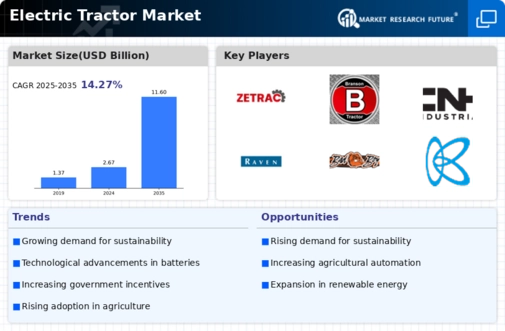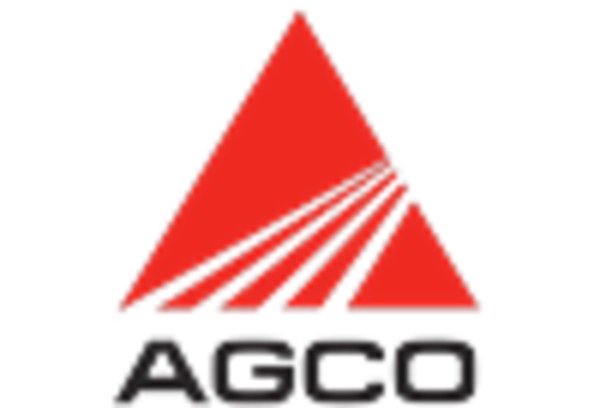Rising Fuel Costs
The Electric Tractor Market is also driven by the rising costs of fossil fuels, which have prompted farmers to seek more cost-effective alternatives. As fuel prices fluctuate, the operational costs associated with diesel tractors can become burdensome for agricultural producers. Electric tractors, with their lower energy costs and reduced maintenance requirements, present a financially attractive option. The potential for significant savings on fuel expenses is encouraging farmers to consider electric tractors as a viable investment. This trend is expected to accelerate the shift towards electric solutions in the agricultural sector, contributing to the overall growth of the market.
Sustainability Focus
The Electric Tractor Market is increasingly influenced by a growing focus on sustainability and environmental responsibility. Farmers and agricultural businesses are becoming more aware of the environmental impact of traditional diesel tractors, which contribute to greenhouse gas emissions and soil degradation. Electric tractors, with their zero-emission operation, present a viable alternative that aligns with sustainable farming practices. This shift is further supported by consumer demand for sustainably produced food, prompting farmers to adopt electric tractors to enhance their eco-friendly credentials. The market is expected to expand as more stakeholders recognize the long-term benefits of sustainable agricultural practices.
Government Incentives
The Electric Tractor Market is benefiting from various government incentives aimed at promoting the adoption of electric vehicles in agriculture. Many governments are implementing subsidies, tax breaks, and grants to encourage farmers to transition from conventional tractors to electric models. For instance, some regions offer financial assistance for purchasing electric tractors, which can significantly reduce the initial investment burden. These incentives not only make electric tractors more accessible but also stimulate market growth. As governments continue to prioritize clean energy initiatives, the Electric Tractor Market is likely to see increased adoption rates, further bolstering its expansion.
Technological Advancements
The Electric Tractor Market is experiencing rapid technological advancements that enhance the efficiency and performance of electric tractors. Innovations in battery technology, such as lithium-ion and solid-state batteries, are significantly improving energy density and reducing charging times. These advancements enable electric tractors to operate longer on a single charge, making them more appealing to farmers. Additionally, the integration of smart technologies, including GPS and IoT, allows for precision farming, which optimizes resource use and increases productivity. As a result, the market is projected to grow at a compound annual growth rate of over 20% in the coming years, driven by these technological improvements.
Increased Crop Production Demands
The Electric Tractor Market is influenced by the increasing demands for crop production driven by a growing global population. As food security becomes a pressing concern, farmers are under pressure to enhance productivity and efficiency. Electric tractors, with their advanced capabilities and lower environmental impact, are well-positioned to meet these demands. The ability to operate in diverse conditions and the integration of precision agriculture technologies allow electric tractors to optimize yields. Consequently, the market is likely to expand as farmers adopt electric tractors to improve their operational efficiency and meet the rising demands for food production.

















